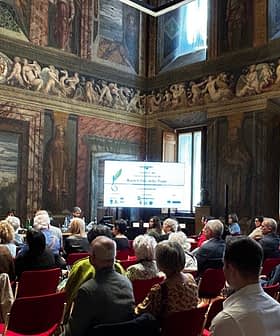Thousands of abandoned olive trees in central Italy are being restored by a new association recently formed in the region.
They finally see the chance to bring new life to olive groves inherited by their own ancestors.
The association, Gli Olivi di Etruria (The Etruscan olive trees), is tackling the problem of abandoned groves by employing advanced business models, cost reductions and new pruning and harvesting techniques.
The group of oil mills, farmers, owners and volunteers was founded in Montefiascone.
“We needed to gather within an association because of the ever-growing demand for our services, and the cultural and social implications of our work,” the association’s president Pierluigi Presciuttini told Olive Oil Times.
“So many landowners have stopped producing olive oil in the last decades due to their age or low productivity, and so many trees can be restored. In just a six-mile radius from here, there are at least 15,000 abandoned trees. In the Lazio region only, we are talking of at least 100,000 trees nobody is taking care of,” he added.
See Also:Native Andalusian Olive Varieties Could Be Wiped Out by 2100, Researchers WarnFamilies of growers who employed traditional olive farming methods were slowly nudged out of the market by growing competition. Many opted to take care of just a handful of trees to provide for their personal olive oil needs. The other trees, sometimes many, were abandoned.
“But their love for the olive tradition of our lands did not falter a bit,” Presciuttini said. “They are enthusiastic about our work. They finally see the chance to bring new life to olive groves inherited by their own ancestors.”
“They have the chance to see their fields beautiful, as they used to be and to have a little income from their trees,” he added. “For us, it means the chance to harvest many more olives and to make this special business grow.”
The association has focused on pruning techniques that reduce overall costs while maximizing the productivity of the hours spent in the field. In an area where costly traditional olive tree pruning and harvesting techniques are still widespread, volunteers manage their groves using the “simplified polyconic vase” technique.
The approach gets its name from the shape of the pruned trees, which resemble an empty vase with three or four branches serving as the “walls.” This approach has been found to improve operators’ efficiency dramatically, while also enhancing the productivity of the tree. Association volunteers were trained in the polyconic technique.
“Thanks to the gathering for these courses, many friends decided to volunteer for the association. Our goal is to restore the groves and all together produce a high-quality extra virgin olive oil that can win the appreciation of the experts and the interest of the consumers,” Presciuttini said.
The association is also employing night-time harvesting to preserve the fruits from heat and sunlight, as well as the most advanced mechanical means for oil production. The association operates in the Etruria region, which extends from Rome to northern Tuscany, and which is home to some of the best and more productive olive varieties in Italy.
While initial efforts have been promising, the association plans to expand its activities with more volunteers working in the field to restore abandoned groves.
“As soon as the Covid-19 emergency is over, we are ready to multiply our efforts,” Presciuttini said.


 Apr. 1, 2020 11:58 UTC
Apr. 1, 2020 11:58 UTC Paolo DeAndreis
Paolo DeAndreis






